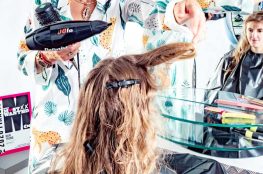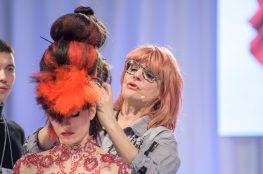As with your skin your hair is an outward reflection of inner health. To be in it’s best condition the cells of your hair need a regular supply of key nutrients.
You may or may not know that your hair is the last of any of your bodies cells to receive nourishment from your diet. It is therefore vitally important to healthy hair that you have a balanced diet rich in nutrition. If you are not eating enough of the good stuff you can be sure that your hair & nails looking tired and brittle will be some of the first signs that let you know your diet is not up to scratch. Take a look at some of our superfoods in order to make sure that your hair is given all of the nourishment it needs to grow strong and shiny! Be kind to your hair and it will be kind to you…
Protein
Protein is the hairs’ primary component and a diet rich in it is essential for strong and healthy hair. Without enough protein hair becomes brittle, weak and highly prone to breakage.  Excellent sources of protein include chicken, turkey, fish, dairy products and eggs along with vegetarian sources such as beans and nuts.
Excellent sources of protein include chicken, turkey, fish, dairy products and eggs along with vegetarian sources such as beans and nuts.
Iron
Iron is a vital mineral to your hair and a deficiency is a serious cause of hair loss. The hair follicle and root are nourished by a nutrient rich blood supply and when iron levels fall too low this disrupts the nutrient supply to the follicle, affecting the hair growth and thus possibly leading to shedding. Animal products such as red meat, chicken and fish provide iron with a high bioav
ailability, meaning the iron is readily available to the body. Vegetarians can raise their iron levels by including lentils, spinach and other leafy green vegetables such as broccoli, kale and salad greens.
Vitamin C
Vitamin C aids the absorption of iron so it’s good to combine vitamin C rich foods with the iron rich! Vitamin C is also an antioxidant and the best sources are blackcurrants, blueberries, broccoli, guava, kiwi fruits, oranges, papaya, strawberries and sweet potatoes. Technically vitamin C helps in the production of collagen that strengthens the blood vessels which nourish the hair shafts.
Omega-3
Omega-3 fatty acids are essential fats that the body cannot make on its own and therefore must be consumed via diet. Omega-3s are found in the cells of the scalp and provide oils to keep your scalp and hair hydrated. Oily fish such as salmon, herring, sardines, trout and mackerel are winners and if you’re a vegetarian try plant sources including avocado, pumpkin seeds and walnuts.
Vitamin A
Vitamin A is used to make Sebum which is an oily substance created by the hairs sebaceous glands, providing your bodies own make-shift conditioner for a healthy scalp. If you have low sebum you may experience an itchy scalp and dry hair. Meat and orange/yellow coloured vegetables which are high in the beta-carotene which produces Vitamin A such as carrots, pumpkins and sweet potatoes.
Zinc and selenium
Further scalp protection involves important minerals such as zinc and selenium. Low levels of zinc lead to hair loss and a dry, flaky scalp. Look for fortified cereals and wholegrains for zinc rich foods along with oysters, beef and eggs.

Vitamin E
Vitamin E provides protection for your hair from the sun just as it does your skin. Good sources of vitamin E can be found in nuts & seeds, providing zinc and selenium as well as vitamin E so try to include them in small regular quantities as part of a balanced diet.




